| Srl | Item |
| 1 |
ID:
160076
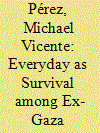

|
|
|
|
|
| Summary/Abstract |
This article examines the role of repetition in the making of everyday life among ex-Gaza refugees in Jordan. It argues that the quotidian struggles of stateless ex-Gazans challenge theories of the everyday that align repetition with domination and creativity with resistance. I suggest that the ability to repeat ordinary activities in work and at home possesses its own form of agential effort: Survival. Concerned with the existential struggles of stateless refugees, I argue that the mundane repetitive practices of everyday life in a precarious situation can enable various opportunities for subjective stability and the promise of a better life in an unstable world.
|
|
|
|
|
|
|
|
|
|
|
|
|
|
|
|
| 2 |
ID:
160077
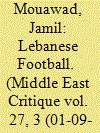

|
|
|
|
|
| Summary/Abstract |
The growing literature on sports in Lebanon tends to portray football as often implicated in the production of sectarian belonging and national disintegration. This article lays out key features of the complex politicization of sports in Lebanon vis-à-vis the discourse of national unity. It shows how the ruling elite uses sports to reaffirm its position as custodian of the hegemonic discourse of national unity that revolves around religious communities living together. It further demonstrates how normal citizens through everyday practices, and when not under the dominion of the elites, tend to ‘imagine from below’ a country that is not only powerful and defiant but also able to compete with the very countries that reputedly interfere in its domestic politics.
|
|
|
|
|
|
|
|
|
|
|
|
|
|
|
|
| 3 |
ID:
160075
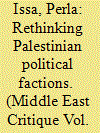

|
|
|
|
|
| Summary/Abstract |
This article questions a dominant understanding of Palestinian political factions in the refugee camps of Lebanon, which defines them as bounded structures defined by their respective ideologies. By examining the everyday practices of Palestinian refugees vis-à-vis factions, the article demonstrates that Palestinians approached factions through personal encounters with family members, friends or neighbours, rather than on ideological bases. It highlights two main points: Firstly, the central role trust plays in building political relations, particularly when constant war, displacement and discrimination define the quotidian existence of Palestinian refugees. Secondly, it brings to light how Palestinians negotiate their personal engagement with the factions, while publicly opposing them.
|
|
|
|
|
|
|
|
|
|
|
|
|
|
|
|
| 4 |
ID:
160078
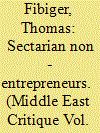

|
|
|
|
|
| Summary/Abstract |
In light of the increasing relevance of sectarianism in recent years, not least in the wake of the Arab revolts since 2011, this article investigates ‘everyday sectarianism’ in Kuwait and Bahrain. It employs the notion of sectarian non-entrepreneurs to address and study how ordinary people live, understand and reproduce sectarian dichotomies, imaginaries and narratives in their everyday lives. The article thereby challenges and broadens a more conventional idea of sectarian entrepreneurs that places key community leaders as the central agents in producing sectarianism. By engaging with people’s everyday experiences, it shows the relevance of the ‘everyday’ as a theoretical concept apt to investigate political and cultural dynamics in the Middle East.
|
|
|
|
|
|
|
|
|
|
|
|
|
|
|
|
| 5 |
ID:
160073
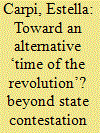

|
|
|
|
|
| Summary/Abstract |
The convoluted relationship between the state and citizens in conflict-ridden Syria often has been reduced to a binary of dissent and consent. Challenging these simplistic categorizations, this article analyzes how state mechanisms resonate in the everyday lives of Syrians since the beginning of the crisis. Drawing on ethnographic insights from Syrian refugees in Lebanon and Syrian Kurds in northeastern Syria, this article shows how state, society and political opposition function as relational processes. Then, it identifies the limitations of contemporary strategies of everyday political contestation through the theory of Syrian intellectual ‘Omar ‘Aziz’s ‘time of the revolution.’
|
|
|
|
|
|
|
|
|
|
|
|
|
|
|
|
| 6 |
ID:
160074


|
|
|
|
|
| Summary/Abstract |
Located in Libya’s capital city of Tripoli, Abū Salīm Prison has become suspended in Libya’s national collective memory as the site of a contested prison killing in 1996. During the late 1980s and early 1990s, the prison hosted many prisoners of conscience, namely individuals who forcibly had been disappeared because security personnel suspected them of opposing the regime of Mu’amar Qadhdhafi. Drawing on interviews with their family members, I trace how Libyan families contested the state’s violence and forced disappearance through everyday behaviors, such as inquiring about their relatives’ whereabouts and visiting Abū Salīm Prison. The article contributes to an ongoing discussion within sociology, anthropology, and area studies about the significance of small-scale acts of resistance as forms of political action. Disappearance not only pulled people apart, but also brought them together, often around the same spaces that were intended to disenfranchise them.
|
|
|
|
|
|
|
|
|
|
|
|
|
|
|
|